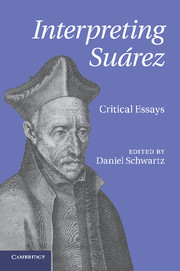Book contents
- Frontmatter
- Contents
- Notes on contributors
- Acknowledgements
- Abbreviations and method of citation
- Chapter 1 Introduction
- Chapter 2 Fundamentals in Suárez's metaphysics: transcendentals and categories
- Chapter 3 The reality of substantial form: Suárez, Metaphysical Disputations xv
- Chapter 4 Suárez on the ontology of relations
- Chapter 5 Suárez's cosmological argument for the existence of God
- Chapter 6 Action and freedom in Suárez's ethics
- Chapter 7 Obligation, rightness, and natural law: Suárez and some critics
- Chapter 8 Suárez on distributive justice
- Chapter 9 Suárez on just war
- Bibliography
- Index
Chapter 8 - Suárez on distributive justice
Published online by Cambridge University Press: 05 December 2011
- Frontmatter
- Contents
- Notes on contributors
- Acknowledgements
- Abbreviations and method of citation
- Chapter 1 Introduction
- Chapter 2 Fundamentals in Suárez's metaphysics: transcendentals and categories
- Chapter 3 The reality of substantial form: Suárez, Metaphysical Disputations xv
- Chapter 4 Suárez on the ontology of relations
- Chapter 5 Suárez's cosmological argument for the existence of God
- Chapter 6 Action and freedom in Suárez's ethics
- Chapter 7 Obligation, rightness, and natural law: Suárez and some critics
- Chapter 8 Suárez on distributive justice
- Chapter 9 Suárez on just war
- Bibliography
- Index
Summary
Suárez departed from Aquinas and Aristotle on a number of issues. Justice is among these. In this chapter I offer an exposition of Suárez's theory of distributive justice, which, until very recently, has not been the subject of scholarly attention.
While De legibus contains little in the way of a sustained analysis of justice and its types, such treatment can be found in some of his other works. Principal among these is his De iustitia Dei, the fruit of a controversy between Suárez and fellow Jesuit Gabriel Vázquez, whose relationship was marked by overt, often bitter, personal rivalry. What triggered the controversy was Suárez's criticism of some of the views put forth in the second book of Vázquez's De cultu adoratione of 1593. Suárez discussed divine justice in more detail in a public lecture delivered at Coimbra four years later, which was harshly criticized by Vázquez in his Commentary on the First Part of the Summa Theologiae. Suárez retaliated by including the lecture that was attacked in his 1599 Opuscula theologica, by reiterating his views on justice in a Lecture on Merit prepared for the academic year 1598–9 (undelivered as classes were adjourned because of an epidemic), and by writing the Disputatio de iustitia Dei.
- Type
- Chapter
- Information
- Interpreting SuárezCritical Essays, pp. 163 - 184Publisher: Cambridge University PressPrint publication year: 2011
- 1
- Cited by



